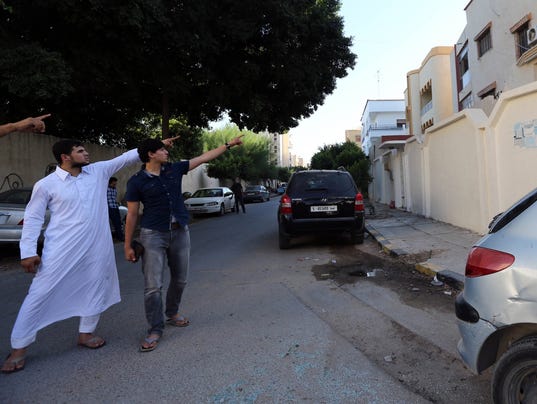I agree that it is
very important to be able to strike terrorists at the time
of our choosing and as Dr. Jenkins says with a taste of their
own medicine. But with all due respect to the great Soldiers and Sailors
who executed the raids in Libya and Somalia recently, I think it
would be useful to keep in mind that there are a lot more special operations capabilities
available to the US to do more than conduct counterterrorism/direct
action raids and there is a lot more that can and should be done to counter the unconventional warfare
that is being conducted by our enemies either directly against the US or
against our friends, partners, and allies. We have the greatest
surgical strike capability in the world as has been demonstrated time
and again in the big name raids we read about and see in the news and the
movies (and also every single night for years in Iraq and Afghanistan
that we don't read about). It is perhaps good that our special
warfare capabilities remain behind the scenes because their
work takes a lot longer to come to fruition. But in the end it is not
either/or among SOF capabilities (surgical strike and special warfare)
but a both/and proposition.
How war on terrorism has evolved: Column
Brian Michael Jenkins6:23 p.m. EDT October 23, 2013
Recent commando raids in Libya and Somalia emphasizes importance of U.S. special forces.

(Photo: AFP/Getty Images)
STORY HIGHLIGHTS
- In the past, the U.S. sought to outlaw terrorist tactics, not engage terrorists directly.
- But counterterrorism has evolved into a multidimensional, multifront war on terror.
- With recent surprise raids, U.S. commando gave terrorists taste of their own medicine.
The two U.S. commando raids in Libya and Somalia this month represent a new thrust by the Obama administration in America's war on terror. What we're seeing are super-precision operations that are responding very rapidly to nearly live-time intelligence.
While U.S. drone strikes directed against terrorist leaders will continue to be part of our arsenal, even President Obama has acknowledged a "new phase" in our terrorism fight. He has recently stated that drones will be used more narrowly to lessen the risk of civilian casualties — a point amplified Tuesday inreports by Amnesty International and Human Rights Watch.
This is a significant shift, largely obscured by the intense news coverage of the government shutdown and debt limit. It has the potential to both reduce public hostility to the drones that is interfering with U.S. objectives in several countries and to improve intelligence by capturing rather than killing terrorist leaders.
Operational intelligence
This month's Navy SEAL raid in Somalia aimed at the leader of al-Shabab, which claimed responsibility for the shopping mall assault in Kenya, proved unsuccessful.But on the same day, in a daring U.S. raid in Libya, Delta Forces captured Abu Anas al-Libi, who is suspected of having planned the 1998 attacks on our embassies in Kenya and Tanzania.
There are several reasons why the U.S. military is increasing its emphasis on similar special forces operations:
Growing capabilities. Here is a domain where the U.S. can fully exploit its ability to collect, analyze and transform intelligence into operational opportunities with little lag time. Special operations demonstrate that the U.S. has a visible military response to a new kind of adversary.
Psychological utility. Terrorists can attack anything, anywhere, anytime, while the U.S. cannot protect everything, everywhere, all the time. This advantage has caused Americans to focus on their vulnerabilities rather than their capabilities. Now, America can turn things around. Terrorists want us to live in fear. We will make them live in fear.
Mission flexibility. Small-scale raids such as those conducted this month have the distinct advantage that, when situations turn unfavorable, they can quickly withdraw without risk to national reputation.
From Delta Force to JSOC
It has been a long march to get to this point — from President Carter's decision in 1977 to create Delta Force, the country's first military unit dedicated to counterterrorism, to today's vast Joint Special Operations Command, which represents a significant component of U.S. military power. Contrast the failure of the 1980 mission to rescue American hostages held in Iran — a consequence of flawed planning, interservice jockeying and bad luck — with the successful attack on Osama bin Laden's villa in Pakistan two years ago.
The U.S. cannot fix all the failed states or eliminate all the badlands where terrorists find sanctuary. But military interventions such as the wars in Afghanistan and Iraq — America's longest military engagements — have taught us, at great cost, that the solution is not large numbers of troops on the ground. Transforming the U.S. Army into an effective counterinsurgent force, however sensible it was in Iraq and Afghanistan, is not a sustainable strategy.
Even limited military interventions involving large numbers of U.S. troops in terrorist environments can lead to disaster, as we learned 20 years ago this month with "Black Hawk Down" in Somalia and 30 years ago Wednesday with the bombing of the Marine barracks in Lebanon.
(Continued at the link below)
No comments:
Post a Comment